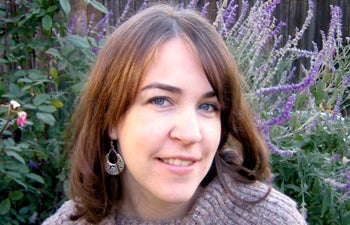Right On Track
Laura Barraclough has been pinching herself lately.
Rather than concocting ill-fated New Year’s resolutions, she kicked off 2013 by accepting a dream job: a tenure-track faculty position as assistant professor of American studies at Yale University. A graduate from the inaugural cohort of students in USC Dornsife’s American studies and ethnicity (ASE) doctoral degree program, which debuted in 2001, she begins her post this Fall.
“I continue to be astounded that this happened for me,” said Barraclough, a Los Angeles native. “I was breathless on the phone when I heard the offer.”
She is of course being modest. Since graduating from USC Dornsife, Barraclough has published two books. Research from her dissertation yielded Making the San Fernando Valley: Rural Landscapes, Urban Development, and White Privilege (University of Georgia Press, 2011).
She co-wrote A People’s Guide to Los Angeles (University of California Press, 2012), an alternative guidebook highlighting places in L.A. where struggles related to race, class, gender and sexuality have occurred. Last month, A People’s Guide received the Association of American Geographers’ Globe Book Award.
“Laura Barraclough is an astute and imaginative interdisciplinary scholar whose scholarship blends social history, cultural criticism and the political and social geography,” said Nayan Shah, professor and chair of American studies and ethnicity. “She really exemplifies the interdisciplinary creativity and broad impact that the Department of American Studies and Ethnicity cultivates and encourages in its doctoral students.”
Shah noted that Making the San Fernando Valley is the first book-length study of the iconic suburb of San Fernando Valley.
“Laura’s insights push scholars in a range of disciplines to rethink the relationship between rural and urban, and the dynamics of racial identities, landscapes and communities,” Shah said.
Content in her current position as assistant professor of sociology at Kalamazoo College, a private liberal arts school in Michigan, she had not applied for jobs broadly last year. But when she saw the listing for Yale she thought, ‘Wow, that sounds exactly like me. I’ll just throw my hat in and see what happens.’ ”
Yale University is among the first American studies programs established in the country, founded after World War II, ASE officials said. The program has commanded a leadership role in training American studies scholars. USC Dornsife’s ASE Ph.D. program was launched at the start of the 21st century with the aim of infusing ethnic studies research methods and approaches into traditional American studies and creating an innovative doctoral training program.
Since then, institutions such as Yale have been following the ASE Ph.D. program in transforming their hiring and graduate training practices to bring scholarship on race and ethnicity, diaspora and borderlands into the center of their program. After an international search, Yale’s hiring of Barraclough is a testament to how vital her research trajectory and accomplishments and the sophisticated and visionary training she received by her mentors at USC Dornsife are to the future of the field of American and ethnic studies.
“Barraclough’s success, along with the appointment of history Ph.D. program alumna Rosina Lozano ’11 as assistant professor of Latino history at Princeton University last year, are some of the highlight faculty appointments from USC Dornsife Ph.D. programs across the board in recent memory,” said George Sanchez, professor of American studies and ethnicity, and of history and vice dean for diversity.

ASE Ph.D. program alumna Barraclough has accepted a tenure-track faculty appointment as assistant professor of American studies at Yale University, to begin Fall 2013. Photo courtesy of Laura Barraclough.
In 2001 ASE began with seven graduate students. The program was considered groundbreaking because it blended American studies and ethnic studies, and it helped to advance the overall direction of American studies as an academic discipline nationally.
“There was a real sense of excitement among the faculty and the students that we were creating something new,” Barraclough recalled. “Because the department was so small, the graduate students had so much attention and enthusiasm from the faculty. It was wonderful to benefit from that excitement.”
ASE has since graduated 38 Ph.D.s, 15 of whom now have tenure-track positions. A number of the program’s recent graduates have received postdoctoral appointments, and other alumni are researchers, lead or have founded nonprofit organizations.
Laura Pulido, professor of American studies and ethnicity, was Barraclough’s dissertation chair and mentor in ASE. The two maintained ties and eventually collaborated along with fellow ASE alumna Wendy Cheng in writing A People’s Guide to Los Angeles.
Barraclough credited the ASE program for equipping her with the skills needed to succeed in the academic profession. She left USC with a concrete understanding of how to get the most out of an academic conference, contact senior scholars in your field and use a dissertation proposal as a networking tool with scholars outside USC.
“ASE really helped me understand how to be an interdisciplinary scholar and to not feel limited by the conventions of what’s already been done within any one discipline,” she said.
Perhaps the most beneficial aspect was the constant emphasis the program placed on disciplined writing. The message was clear: write every day — find a way to work it into your daily schedule. Don’t take long breaks or wait for summer vacation to write and make it a top priority even if you’re teaching four classes a semester.
This lesson enabled Barraclough to publish books and facilitate her transition from her first teaching job at Antioch University to Kalamazoo College and now to Yale.
“Ultimately, although it is an honor and privilege to get to work for Yale, I have learned that it’s possible to be happy and productive in many different kinds of faculty institutions. The skills and knowledge gained from ASE have helped me to be happy in a variety of places.”